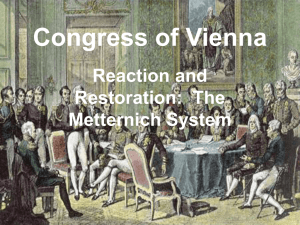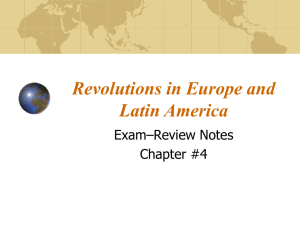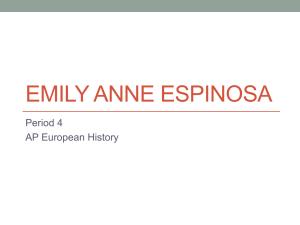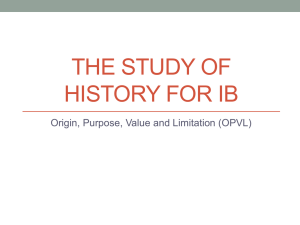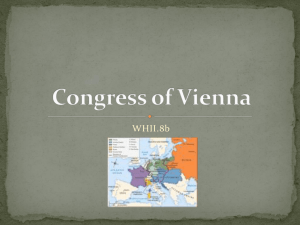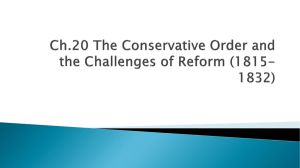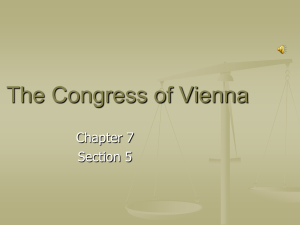The significance of Metternich in European History
advertisement
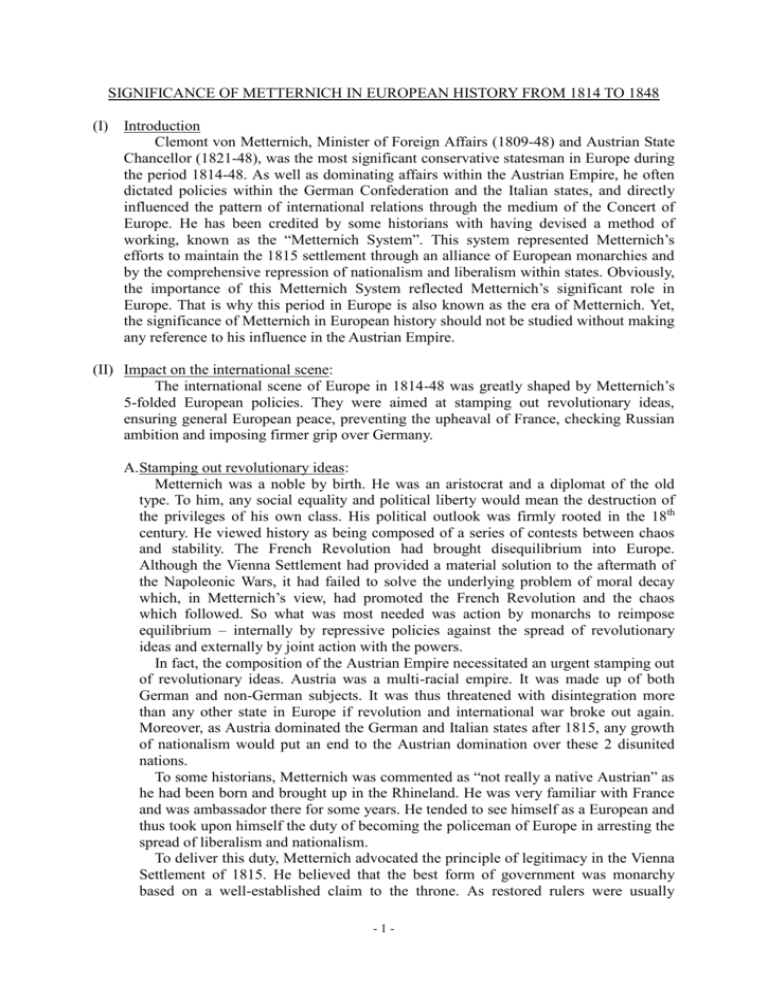
SIGNIFICANCE OF METTERNICH IN EUROPEAN HISTORY FROM 1814 TO 1848 (I) Introduction Clemont von Metternich, Minister of Foreign Affairs (1809-48) and Austrian State Chancellor (1821-48), was the most significant conservative statesman in Europe during the period 1814-48. As well as dominating affairs within the Austrian Empire, he often dictated policies within the German Confederation and the Italian states, and directly influenced the pattern of international relations through the medium of the Concert of Europe. He has been credited by some historians with having devised a method of working, known as the “Metternich System”. This system represented Metternich’s efforts to maintain the 1815 settlement through an alliance of European monarchies and by the comprehensive repression of nationalism and liberalism within states. Obviously, the importance of this Metternich System reflected Metternich’s significant role in Europe. That is why this period in Europe is also known as the era of Metternich. Yet, the significance of Metternich in European history should not be studied without making any reference to his influence in the Austrian Empire. (II) Impact on the international scene: The international scene of Europe in 1814-48 was greatly shaped by Metternich’s 5-folded European policies. They were aimed at stamping out revolutionary ideas, ensuring general European peace, preventing the upheaval of France, checking Russian ambition and imposing firmer grip over Germany. A.Stamping out revolutionary ideas: Metternich was a noble by birth. He was an aristocrat and a diplomat of the old type. To him, any social equality and political liberty would mean the destruction of the privileges of his own class. His political outlook was firmly rooted in the 18th century. He viewed history as being composed of a series of contests between chaos and stability. The French Revolution had brought disequilibrium into Europe. Although the Vienna Settlement had provided a material solution to the aftermath of the Napoleonic Wars, it had failed to solve the underlying problem of moral decay which, in Metternich’s view, had promoted the French Revolution and the chaos which followed. So what was most needed was action by monarchs to reimpose equilibrium – internally by repressive policies against the spread of revolutionary ideas and externally by joint action with the powers. In fact, the composition of the Austrian Empire necessitated an urgent stamping out of revolutionary ideas. Austria was a multi-racial empire. It was made up of both German and non-German subjects. It was thus threatened with disintegration more than any other state in Europe if revolution and international war broke out again. Moreover, as Austria dominated the German and Italian states after 1815, any growth of nationalism would put an end to the Austrian domination over these 2 disunited nations. To some historians, Metternich was commented as “not really a native Austrian” as he had been born and brought up in the Rhineland. He was very familiar with France and was ambassador there for some years. He tended to see himself as a European and thus took upon himself the duty of becoming the policeman of Europe in arresting the spread of liberalism and nationalism. To deliver this duty, Metternich advocated the principle of legitimacy in the Vienna Settlement of 1815. He believed that the best form of government was monarchy based on a well-established claim to the throne. As restored rulers were usually -1- despotic and reactionary, as well as diehard supported of conservatism and enemy of liberalism, they were expected by Metternich to uproot any revolutionary movements to the detriment of peace and stability. Besides it, Metternich adopted political repression against the spread of revolutionary ideas. He passed the Carlsbad Decrees in 1819 after the killing of a reactionary journalist Kotzebue and the the Six Articles in 1832 after the outbreak of the 1830 Revolution. These were applied not only to Austria but also the other states in the German Confederation. After all, there was no freedom of press, speech and association. Universities were strictly supervised and above all, Austria became a police state. Although Metternich tried hard to stop the spread of revolutionary ideas in Europe, the outbreak of revolutions could not be prevented indeed. Thus, Metternich employed the policy of armed-intervention, which was declared in the Troppau Protocol in the Congress of Troppay, 1820, in the suppression of any revolution happening in Europe. Based on this policy, Metternich crushed revolutionary movements in Naples and Piedmont in the 1820s and managed to put down revolts in the Three Duchies and Papal States in 1830. He also gave support to other powers in suppressing revolutions. For instance, in the Congress of Verona, 1822, he gave support to France in suppressing the Spanish revolt. However, 1848 was the year to demonstrate the force of nationalism and liberalism and Metternich fell from power that year. Even though Metternich’s policy of stamping out revolutionary ideas could not end in the complete disappearance of revolutions in Europe, at least, the growth of revolutionary ideas had been checked. In addition to it, his urging for the holding of international congresses also helped to ensure general European peace. B. Ensuring general European peace: After the Battle of Waterloo and the defeat of Napoleon, Metternich decided that the restored monarch had to cooperate and there had to be some machineries for concerted action. So he supported the device of periodic congresses, at which the governments of the major powers could agree to a settlement of all disputes that might endanger the peace of Europe. The contention of Metternich was that internal and international affairs were inseparable. In giving the European alliance its anti-revolutionary, anti-liberal character, Metternich had a very clear sense of serving first of all the interests of Austria, the power most vulnerable to popular attack. So, Metternich was very eager to serve as the host in the Congress of Troppau, 1820 and the Congress of Laibach, 1821 after the Congress of Vienna,1814-15. In fact, the holding of congresses facilitated her implementation of the policy of armed intervention. C. Preventing the upheaval of France: To maintain the supremacy of the Austrian Empire and to ensure the European peace, Metternich helped in preventing the upheaval of France. In the Vienna Settlement, barrier states were erected around France so that all states on French frontiers would be strong enough to hold up any recurrence of French aggression long enough for the powers to mobilise their forces. In the 1830s, the danger of France appeared again during the Mehemet Ali Crises. France promised help to Mehemet Ali in order to extend French trade in the Near East. In 1839, a conference was called in London at which Austria together with Britain, Russia and Prussia decided to limit the power of Mehemet by keeping him Egypt. Therefore, the cooperation of the European -2- powers and their threats made France withdraw its support to Mehemet and her aggression in the Near East was checked. D.Checking Russian ambition: To check Russian ambition in Europe was another means used by Metternich to maintain the supremacy of the Austrian Empire. In the Congress of Vienna, Russia was prevented to acquire the whole of Poland. In the Congress of Aix-la-Chapelle of 1818, Metternich opposed to the Russian proposal of sending a collective expedition to crush revolts in the Spanish colonies in S. America because there would be the danger of Russian troops across the European colonies. Metternich was also not determined to see Russia dominating in the Balkans because Russia had greatly expanded her influence there in the Greek War of Independence and the Mehemet Ali Crises. So Metternich intervened with other powers in checking the Russian expansion into the Balkans. In the Straits Convention of 1841, the powers agreed that the Dardanelles was to be closed to the ships of all the nations including Russia during wartime. Therefore, it destroyed the Treaty of Unkiar-Skelessi of 1833 which gave exclusive right for Russia to use the Dardanelles during war time; and the Russian expansion into the Balkans was thus checked. E. Imposing firmer grip over Germany: Being the President of the German Confederation, Austria, under the leadership of Metternich, imposed firmer grip over it after 1815. Metternich secured the presidency of the Diet of the German Confederation for Austria in 1815. This position was of decisive importance for the president decided upon the business to be discussed and the procedure to be adopted in the Diet. Although the leadership of Austria was gradually challenged by Prussia in the German Confederation, Metternich was still competent in maintaining the supremacy of Austria in the German Confederation before his resignation in 1848. To conclude Metternich’s significance in Europe, it is appropriate to say that internationally, Metternich had greatly contributed to the checking of the growth of revolutionary ideas in Europe and maintaining European peace by holding congresses, preventing the upheaval of France and checking Russian ambition, and internally he had contributed to the keeping of the Austrian supremacy in the German Confederation. (III) Impact on the Austrian Empire: A study of the significance of Metternich should not be limited to Metternich’s influence on the international scene in Europe. It should be extended to how he influenced the Austrian Empire as well. A.Lack of reforms: Metternich was not totally in opposition to changes, but he believed that changes had to be gradual only. Metternich was never ignorant of the need to reform. So he attempted to restructure the administrative system and to improve the relationship between Vienna and the outlying provinces of the Austrian Empire. Apart from these few reforms, he did not carry out other essential ones, particularly social and economic reforms. It was accountable for the backwardness of the Austrian Empire when other European countries were making rapid economic progress. So, even serfdom, an outdated social system, was still retained. Metternich feared that fundamental social reforms would upset the internal equilibrium of the class structure -3- and prepare the way for destructive revolutionary forces. As a consequence peasant grievances mounted. Although Metternich should not be blamed for his lack of vision in carrying out reforms to strengthen Austria, it is true that Metternich was confronted with real obstacles impeding changes. The most serious one came from the Emperor Francis I who had a distrust of modern innovations and constantly turned down Metternich’s proposals for reforms. After 1835, the monarchy was ruled by a Council of State which Metternich could not always control, and within which Kolowrat, the Minister of Interior since 1826 and the enemy of Metternich, intrigued for support. Not surprisingly, Metternich once remarked, “I have sometimes held Europe in my hands but never Austria.” No wonder why Metternich regarded his concern with domestic affairs as being secondary to his role as Foreign Minister. That also explained why Metternich was blamed for the devotion of most of his time to external affairs as Metternich could not have enough support in carrying out internal reforms. B. Financial exhaustion: Perhaps the greatest damage Metternich did to the Austrian Empire was to continue promoting her as a “European necessity”. This self-imposed mission to uphold the central European balance against encroachment from Russia and France, and to keep Italy and Germany within her conservative orbit, was beyond the resource of Austria to sustain. Austria had emerged from the Napoleonic Wars in a state of financial exhaustion. Since then, the government had persistent budgetary problems. While the limited financial resources were diverted towards the European affairs, other areas of domestic need went without and Metternich’s true priorities were once again emphasized. C. Dismemberment of the Empire: Besides the financial weakening of the Austrian Empire, racial factor was another reason for the decline of the Austrian Empire. Apart from controlling the centrifugal force of nationalism by upholding the one centripetal power, the traditional authority of the Hapsburg dynasty, he exploited the policy of “divide and rule”. Metternich had no plan to amalgamate the separate racial groups within the empire into a more unified Austrian state. On the contrary, he promoted provincial identities by sponsoring the development of local cultural traditions. For instance, he backed a Czech revival in Bohemia which was characterized by renewed interest in language, literature and history. Through this method, he hoped that antagonism between the different races could be encouraged and the different nationalities would keep each other in check. However, by doing so, Metternich unwittingly awakened in many people the realization that they were not German. The next logical step was for them to get independence from the Austrian Empire. (IV) Conclusion In retrospect, Metternich was important in the European history for his contribution in the international diplomacy. Yet, he should also be blamed for his inability to prevent the decay of the Austrian Empire. He finally became one of the principal casualties in the collapse of the Austrian Empire when he fell from office in 1848. -4-
